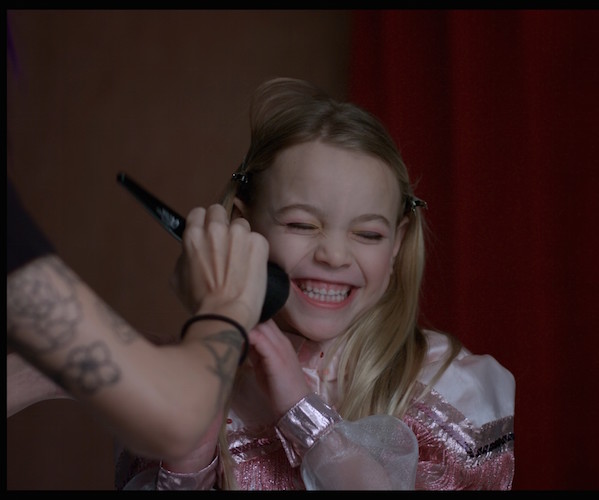Film Review: “Casting JonBenet” — Of Crime and Psychodrama
In this attempt to get at the ‘truth,’ the filmmakers have come up with a unique approach: the actors don’t play the roles; the roles play the actors.
Casting JonBenet, written and directed by Kitty Green. Streaming on Netflix

A scene from the Netflix documentary “Casting JonBenet.”
By Tim Jackson
I didn’t follow the JonBenet Ramsay story when it dominated the news in 1996. The reports were endless, and the continuous stream of sordid speculation on this (or any) child’s exploitation and murder feels obscene. The story never went away, and the crime remains unsolved. There have been countless tabloid articles, books, and movies recounting, speculating, and imagining what occurred on that Christmas Eve. Netflix has now produced yet another take on the sensationalized mystery, Kitty Green’s Casting JonBenet, a psychodrama that swings between narrative and documentary. JonBenet’s was killer never found, the case was bungled, and the family suffered from years of rumors and accusations. In this attempt to get at the ‘truth,’ the filmmakers have come up with a unique approach: the actors don’t play the roles; the roles play the actors.
The film draws on (mostly) experienced performers from Boulder, Colorado, where the murder occurred. We see them audition for various (many of them small) parts of a dramatization of the JonBenet murder. The strategy that serves its enigmatic subject perfectly. Each actor steps into the audition and is asked to speculate on both the characters for whom they are reading and on the crime itself. Each reading and conversation becomes yet another interpretation: ‘reality’ imagined through the appearance and emotional responses of the actors. Each role is read by multiple actors, who then converse among themselves about their impressions of the crime and motives of those involved. Luckily, the actors are prepared and knowledgeable: the result is that we get the facts while we experience the intriguing interaction of role and the player’s ‘real’ self. After reading sections of the script, each actor explores, while speaking directly to the camera, his or her feelings about what may have happened and why. Surprising and often traumatic revelations about the performers’ personal lives surface. Since much of what the public knows about the murder hinged on gossip, innuendo, and rumor, the multiple interpretations, which draw on the object and speculative, results in an insightful exploration the crime.
This embrace of the confessional could be seen as exploitative, but the performers take their duties seriously and are quite good. Being from Boulder, they have strong opinions on what occurred that night. A professional theater group reads for the roles of John and Patsy Ramsey; a quirky group of boys audition for 9 year-old brother Burke. Among those reading for law enforcement officials there’s a burly actor who tells us that his night job is being a “sex educator.” He calmly demonstrates various ‘light’ flogging techniques. An outspoken crew of Santa Clauses talk about their job and its relationship to children (a Santa had visited the Ramsey household that night). Finally, there is a chilling audition by actor Dixon White as pedophile John Mark Karr, who falsely confessed to the crime.
The auditions are sequenced to contrast the distinctive personalities and preparations of the actors. Their direct address to the viewer alternate with staged scenes that appear to be rehearsals or part of what will be a full production. Several of the recreations, particularly those involving JonBenet, are beautifully impressionistic; that technique is made memorable use of at the film’s end, which crescendos with a tracking shot in which the actors play in multiple scenes simultaneously.
Actors speculate through the use of their imaginations: Casting JonBenet applies, with unusual determination, this ‘creative’ thespian imperative to non-fiction. The upshot is a compelling documentary — yet another version of the ‘truth’ about an unsolved 20-year tragedy.
Tim Jackson was an assistant professor of Digital Film and Video for 20 years. His music career in Boston began in the 1970s and includes some 20 groups, recordings, national and international tours, and contributions to film soundtracks. He studied theater and English as an undergraduate, and has also has worked helter skelter as an actor and member of SAG and AFTRA since the 1980s. He has directed three feature documentaries: Chaos and Order: Making American Theater about the American Repertory Theater; Radical Jesters, which profiles the practices of 11 interventionist artists and agit-prop performance groups; When Things Go Wrong: The Robin Lane Story, and the short film The American Gurner. He is a member of the Boston Society of Film Critics. You can read more of his work on his blog.
Tagged: Casting JonBenet, JonBenet Ramsey, Kitty Green, documentary
